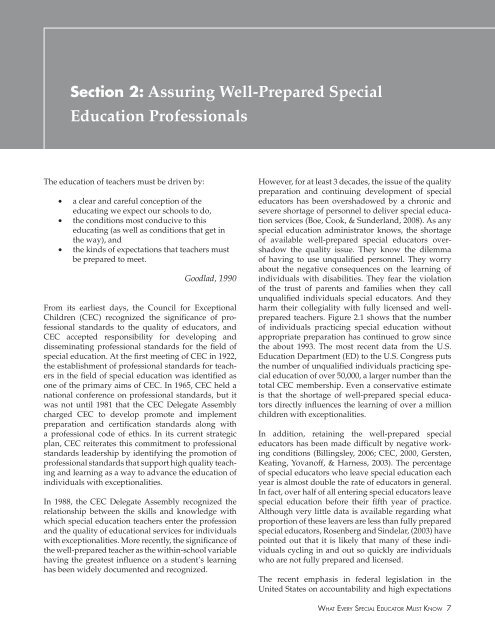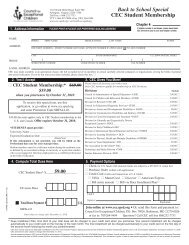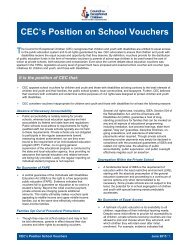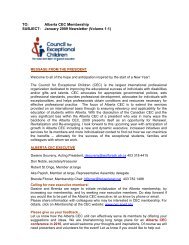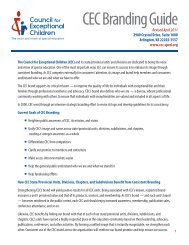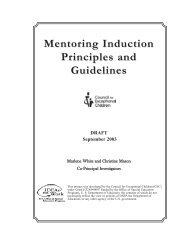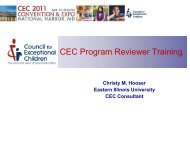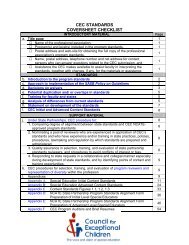What Every Must Know Special Educator - Council for Exceptional ...
What Every Must Know Special Educator - Council for Exceptional ...
What Every Must Know Special Educator - Council for Exceptional ...
You also want an ePaper? Increase the reach of your titles
YUMPU automatically turns print PDFs into web optimized ePapers that Google loves.
Section 2: Assuring Well-Prepared <strong>Special</strong><br />
Education Professionals<br />
The education of teachers must be driven by:<br />
• a clear and careful conception of the<br />
educating we expect our schools to do,<br />
• the conditions most conducive to this<br />
educating (as well as conditions that get in<br />
the way), and<br />
• the kinds of expectations that teachers must<br />
be prepared to meet.<br />
Goodlad, 1990<br />
From its earliest days, the <strong>Council</strong> <strong>for</strong> <strong>Exceptional</strong><br />
Children (CEC) recognized the significance of professional<br />
standards to the quality of educators, and<br />
CEC accepted responsibility <strong>for</strong> developing and<br />
disseminating professional standards <strong>for</strong> the field of<br />
special education. At the first meeting of CEC in 1922,<br />
the establishment of professional standards <strong>for</strong> teachers<br />
in the field of special education was identified as<br />
one of the primary aims of CEC. In 1965, CEC held a<br />
national conference on professional standards, but it<br />
was not until 1981 that the CEC Delegate Assembly<br />
charged CEC to develop promote and implement<br />
preparation and certification standards along with<br />
a professional code of ethics. In its current strategic<br />
plan, CEC reiterates this commitment to professional<br />
standards leadership by identifying the promotion of<br />
professional standards that support high quality teaching<br />
and learning as a way to advance the education of<br />
individuals with exceptionalities.<br />
In 1988, the CEC Delegate Assembly recognized the<br />
relationship between the skills and knowledge with<br />
which special education teachers enter the profession<br />
and the quality of educational services <strong>for</strong> individuals<br />
with exceptionalities. More recently, the significance of<br />
the well-prepared teacher as the within-school variable<br />
having the greatest influence on a student’s learning<br />
has been widely documented and recognized.<br />
However, <strong>for</strong> at least 3 decades, the issue of the quality<br />
preparation and continuing development of special<br />
educators has been overshadowed by a chronic and<br />
severe shortage of personnel to deliver special education<br />
services (Boe, Cook, & Sunderland, 2008). As any<br />
special education administrator knows, the shortage<br />
of available well-prepared special educators overshadow<br />
the quality issue. They know the dilemma<br />
of having to use unqualified personnel. They worry<br />
about the negative consequences on the learning of<br />
individuals with disabilities. They fear the violation<br />
of the trust of parents and families when they call<br />
unqualified individuals special educators. And they<br />
harm their collegiality with fully licensed and wellprepared<br />
teachers. Figure 2.1 shows that the number<br />
of individuals practicing special education without<br />
appropriate preparation has continued to grow since<br />
the about 1993. The most recent data from the U.S.<br />
Education Department (ED) to the U.S. Congress puts<br />
the number of unqualified individuals practicing special<br />
education of over 50,000, a larger number than the<br />
total CEC membership. Even a conservative estimate<br />
is that the shortage of well-prepared special educators<br />
directly influences the learning of over a million<br />
children with exceptionalities.<br />
In addition, retaining the well-prepared special<br />
educators has been made difficult by negative working<br />
conditions (Billingsley, 2006; CEC, 2000, Gersten,<br />
Keating, Yovanoff, & Harness, 2003). The percentage<br />
of special educators who leave special education each<br />
year is almost double the rate of educators in general.<br />
In fact, over half of all entering special educators leave<br />
special education be<strong>for</strong>e their fifth year of practice.<br />
Although very little data is available regarding what<br />
proportion of these leavers are less than fully prepared<br />
special educators, Rosenberg and Sindelar, (2003) have<br />
pointed out that it is likely that many of these individuals<br />
cycling in and out so quickly are individuals<br />
who are not fully prepared and licensed.<br />
The recent emphasis in federal legislation in the<br />
United States on accountability and high expectations<br />
<strong>What</strong> EvEry SpECial EduCator MuSt KnoW


